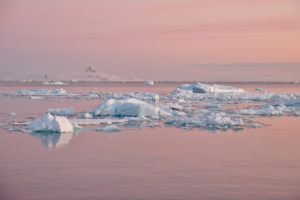
Andrew Bolt used to love writing about Antarctica [adopts sarcastic tone] bringing his laser-like scientific mind to the continent’s sea ice.
In December 2013, News Corp Australia’s climate science mangler-in-chief was delighting in the predicament of Professor Chris Turney, who had led an exhibition to Antarctica but whose ship had become stuck in sea ice.
Screaming of a “media cover-up” the Bolt was unhappy at the media coverage.
“There is no mention that sea ice around Antarctica has steadily increased over the past three decades, contrary to what the Intergovernmental Panel on Climate Change admits its climate models predicted,” he wrote.
In May 2014, Bolt had the headline: “Sea ice grows. What do alarmists say now?”
“If vanishing sea ice was evidence of global warming, what does increasing ice mean?” Maybe he could have asked some scientists.
In September 2014, the Sky News host wrote that sea ice around Antarctica was at a record high and how if any explorers were to venture there in the future, they’d probably get stuck too.
In April 2015, it was “Flannery confounded. Arctic decline pauses; Antarctic sea ice grows“.
Anyway, you get the point.
Bolt loved to write about Antarctica’s sea ice. It was the perfect rhetorical response to stories about the disappearing sea ice in the Arctic.
It was part of a movement about the rising awareness of Antarctica, not just as part of the climate change phenomenon, but also as a destination of stark, pristine beauty. Many people in recent years have taken cruises (learn more about them) to the uninhabited continent, to observe the landscape, the wildlife, and Antarctica’s unique terrain.
Bolt almost never mentioned this terrain, i.e., the ice in Antarctica that’s on the land – the ice sheets – which are melting from underneath and have the potential to deliver several metres worth of sea level rise. The ice that scientists are really worried about, Bolt didn’t talk about much.
So is Antarctica still a Bolt favourite? Not so much.
A Google search of Bolt’s blog from the past six months suggests he has not once managed to type that “A” word that used to be such a favourite.
So what’s changed? Well, in 2016 the amount of ice covering the oceans that fringe the Antarctic continent sort of, fell off a cliff.
The melt season has just finished in Antarctica, and the amount of sea ice left behind was likely at its lowest on record (a record that only goes back to 1979 and the start of the satellite era).
So now that the story doesn’t fit neatly into Bolt’s worldview, he’s decided it’s best to ignore it rather than have an honest discussion about it.
So why has the sea ice dropped away in Antarctica? That’s a live question.
Back in March 2014, the Antarctic Climate and Ecosystems Cooperative Research Centre released a position analysis on the situation with sea ice.
At the time, when sea ice down there was showing near record levels, the ACE CRC report explained this was likely short-lived and that melting glaciers, changes in snowfall and rising temperatures would all play a role in the future.
In the latest episode of Positive Feedback, I spoke to Dr Nerilie Abram, of Australian National University about the changes going on in Antarctica and the challenges in working out what’s behind it all.
Take a listen and subscribe at SoundCloud or iTunes (and that includes you Andrew).
Main image: Antarctic Sound, December 2016. Credit: Flickr/Delphinidaesy (CC BY-NC 2.0)
His supply of subjects for denial are rapidly melting away
When facts do not agree with your opinions the best option is not to look at the facts but rather to ignore them